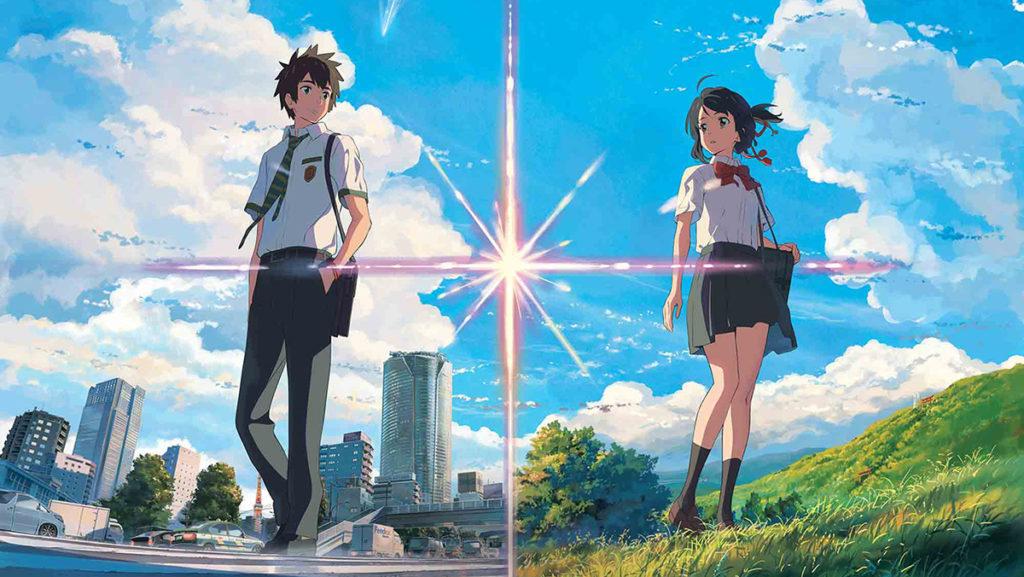Body swapping isn’t new to cinema: It is a device often used in comedies and cartoons for a quick and easy gag. “Your Name,” the anime directed by Mikoto Shinkai, takes this trite conceit and runs with it. But it isn’t “Freaky Friday.”
One morning, Tokyo boy Taki Tachibana wakes up to discover something strange: He’s a girl. In the small, rural town of Itomori, Mitsuha Miyamizu wakes up to the same strange fate. Neither believes their peculiar situation — at least, not at first. They slowly realize that they aren’t dreaming or physically transforming, but rather trading places with someone across the country. Both characters act with the mingled shock and playful bemusement one would expect from people in their situation — taunting each other through messages left in notebooks or in their phones and interfering with each other’s relationships. Eventually, they attempt to bridge the distance between them and find each other.
If “Your Name” was nothing more than a shallow coming-of-age story with a fantastical bent, it wouldn’t be receiving universal acclaim, Shinkai wouldn’t have won Best Director at the Tokyo Anime Awards, and it wouldn’t be one of the greatest anime films of all time.
The film is layered, and as those layers peel away, the tender core of “Your Name” is revealed. The surface romance overlays an environmental disaster, which yet again overlays a coming-of-age story. Both leads have instantly recognizable motivations: Taki is in love with his co–worker, and Mitsuha is desperate to escape rural life. The universality of these conflicts is portrayed with a grounded elegance: Shinkai isn’t afraid to satisfy some ambitions and leave others painfully unachieved. As the plot progresses, these goals become complicated by Taki and Mitsuha’s burgeoning relationship with each other — a storyline so subtly and eloquently portrayed, the viewer doesn’t realize what’s truly happening. It is one of many revelatory moments in “Your Name.”
Nor is Shinkai afraid to shift the direction of the film entirely. About halfway through “Your Name,” the reality of the film is altered. It’s a stunning, heartrending moment that breaks the viewer down while invigorating the characters. Unfortunately, to support the momentous nature of the reveal, early parts of the movie seem convoluted, not mysterious. These “plot holes” are distracting, to say the least: Why can’t Taki call Mitsuha? Can Taki really not remember the name of Mitsuha’s town? These questions are, for the most part, answered, but they are obnoxiously distracting prior to their resolution.
The latter portion of the film more than compensates. “Your Name” culminates in a race against the clock. In these desperate moments, the film ratchets up the tension while maintaining the emotionality that made the opening so powerful. As the denouement speeds toward its end, the bittersweet fate of the characters seems decided. But once again, Shinkai changes the game. Happy endings are often undeserved, particularly in animated movies, but “Your Name” gives Taki and Mitsuha a glowing conclusion that leaves the viewer relieved and elated.
As one would expect from Funimation, “Your Name” is gorgeous. Verdant fields rustle with a gentle passing breeze, the tall grass taking on an oceanic quality in the moonlight. Tall skyscrapers are simultaneously austere behemoths of girder and glass, and brilliant spectacles of neon and glinting reflections. Each character is articulated with intimate detail — faces are expressive, hair flows luxuriously and clothing flaps with realistic fluidity. Though it doesn’t achieve the visual mastery of Studio Ghibli, it certainly comes close.
There are moments when “Your Name” is akin to a troupe of dancers skittering around a stage. The frames flow with intoxicating grace, making the story and characters feel more alive than the theater and the chairs and the bags of popcorn in the viewers’ hands.
Nestled in a story of urban fantasy are truths about growing up, about having dreams and falling in love. Watching the film is like becoming a high schooler again — the oppressive weight of the unknown stretching endlessly ahead pairs with the freedom and exhilaration of being a kid. Shinkai deserves a place in the pantheon of Miyazaki and Takahata; he created a film that won’t be forgotten.




















